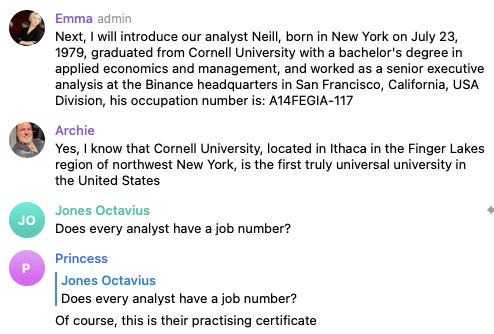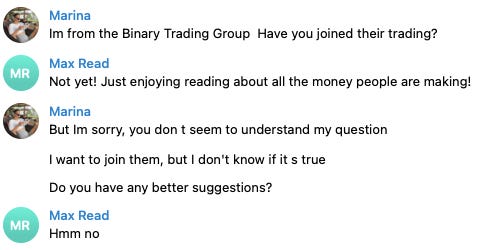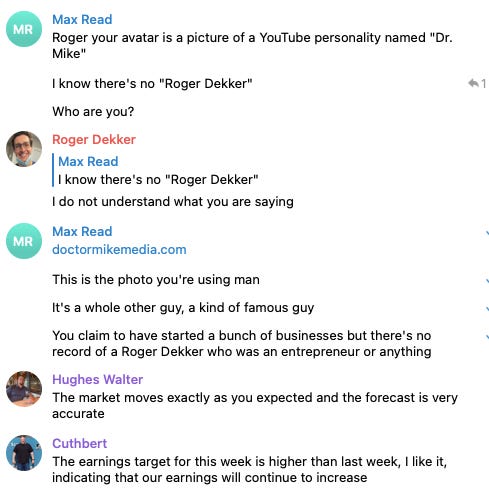My life in the Telegram Bitcoin scam group chat of ghosts
Can Analyst Neil of Bain Capital make me rich?
A few weeks ago I found myself invited into a chatroom on the Russian messaging app Telegram, a platform popular among crypto enthusiasts. The chatroom was called “👑BTC Binary Trader Group 🌍📊 88,” and it was occupied by 330 or so strangers. Initially, there was some confusion about its purpose:
Luckily, Emma, one of the group admins, arrived to clarify:
As Emma explained it, she and Analyst Neil -- who sometimes spells is name with one L and sometimes with two -- both work for the Boston-based private-equity firm Bain Capital.
Neil had started the chat to discuss cryptocurrency trading strategy; some of the participants, like Roger and Lizzie Pacciani, were returning beneficiaries.
My fellow chat members were intrigued. One, Roger Dekker, whose avatar featured a smiling man in scrubs and a face mask, said he’d worked with Bain before.
Still, there was some confusion. Why was Bain (Bane?) Capital freely helping pathetic scrubs like me -- and on a Russian messaging app, to boot? Some of my fellow chatters had theories.
Emma was there, of course, to clarify some facts about Bain.
The chat was beginning to grow impatient. Where was analyst Neil/Neill?
But first, Emma wanted to provide some background information about Analyst Neil(l), so we’d understand his qualifications.
Fellow users Archie and Princess provided some important context.
Emma even provided, for reference, a glowing and trustworthy quote from CNBC’s Bob Pisani.
While Billy felt more confident, having seen Neil(l)’s face, Robby was -- cheekily -- less convinced. But concerns about Neil(l)’s professionalism and temperament were quickly swept aside when Analyst Neil himself arrived, spelling his own name with only a single L:
The chat welcomed Neil(l)’s advice, and shared some stories of financial turmoil of their own. Roger was apparently both a medical professional and an entrepreneur.
Soon Analyst Neil(l) was sharing his investment advice --
-- to enormous profit.
But how could a normal person like me participate in the enormous gains offered by Bain Capital and Analyst Neil/Neill? How could I be like Lizzie Pacciani, or like Rudy 3.0, who for some reason was sharing photos of gloves and a big massage chair?
Luckily Emma was there to put down some rules. No cursing! Friendship is the most important!
And, indeed, I was lucky enough to make some real friends, like Marina, who messaged me directly just to express her own skepticism. It’s nice to find people you can trust in situations like this!
But even better, Emma herself was kind enough to extend an olive branch of friendship.
Big money, here I come!
It goes without saying, I hope, that this chat is a scam -- a variation on the sha zhu pan, or “pig-butchering” scams that have become common on messaging apps and SMS, often perpetrated in what amount to scam sweatshops, operated by shady Chinese gambling rings and “staffed” by trafficked Chinese nationals held under threat of physical violence in Indonesia or Myanmar. I wrote about the wrong-number variants of these a couple months ago; here, the core of the scam -- in which a friendly face, over the course of a long “fattening” period, offers inside investment advice -- remains the same. But in this scenario, a crowd of touts and shills are meant to lull victims into compliance. These very real people can’t possibly all be scam victims, right?
Even knowing that you’re watching an attempted scam unfold, the experience of the chat is uncanny and disorienting. It’s a pocket universe of mental uncertainty: Is anyone else in the chat “real”? Have all 330 of the these people been assembled for the purpose of fooling me, like a bootleg, slightly janky Truman Show? For that matter are they actually people? Are they puppets? Actors? Bots?
Certainly, as far as I can tell, no one contributing is the person they represent themselves to be. I doubt, for example, that this person is “Amy”:
Unless Amy is a former Lockport Township Fire District Trustee. And the extremely enthusiastic and talkative entrepreneur and investor Roger Dekker…
…bears an uncanny resemblance to a YouTube medical personality named Doctor Mike.
Most of the other avatars are a bit more difficult to identify, possibly because they were scraped from social-media pages and/or purchased from one of the many marketplaces where scammers buy packs of images.
When I tried reverse image searching the photos of “Analyst Neil” himself, the only result that came up was another shady Bitcoin-focused Twitter account, on which he was identified as “Andrew Thomas, Member of the Institute for Advanced Study at Rockefeller University [and] Member of the Institute of Mathematics at Berkeley University.”1




But that doesn’t fully answer our questions, does it? Amy and Roger Dekker and Jones Octavius and Analyst Neil(l) aren’t “real,” in the sense of being people with those names and those faces out there in the world, typing into the Telegram chat. But there are real, flesh-and-blood humans typing the words attributed to them … right? Or are they bots?
The Global Anti-Scam Organization, a nonprofit that researches and writes about online scams that originate in Southeast Asia, told me over email that the chat was “likely a dozen or so individuals that handle many phones (human trafficked labor is cheap) and use apps sold on the Chinese black market that allow the use of multiple numbers.”
So the characters in the chat are probably not bots, but nor is each one a role played by an actor-conman in Sihanoukville or Shwe Kokko. Instead, they’re something like puppets, fake-account marionettes manipulated into dialogues that seem to be some combination of scripted, plagiarized, and poorly machine-translated2. (“Yes, I know that Cornell University, located in Ithaca in the Finger Lakes region of northwest New York, is the first truly universal university in the United States.” What???)
It’s tempting to look at this and shudder -- to imagine the strange world of the 300-strong Telegram investment chat as a brave new frontier in cons. But I don’t know. A long time ago in Rome I watched a guy with a little folding table run a three-card monte game. I don’t actually remember if it was cups or shells or folded cards or what, but I remember being amazed at how many people were stepping up to the table to play. Some of them won, some of them lost, but he had a constant flow of suckers challengers, and a little crowd had formed around the table. I walked away, and, a few hours later, still wandering around the city, I passed by the guy who’d been running the game, carrying his folding table. He was walking and talking amiably with four or five people -- who, I realized a second later, were all the same people who’d been playing the game. Shills, touts, plants, and actors are as old as scams themselves; maybe the internet just makes their production a little more efficient.
Anyway, at some point I’d had enough.
The GIF was not a satisfying answer, so I tried to push Rog a little bit.
At that point, the admins kicked me out of the chat. I like to think that they’re all still in there, chatting about money, waiting for Analyst Neil’s next trade.
Just, to peek a bit further down this particular rabbit hole: If you look closely at the “Andrew Thomas” photos you can see him a lanyard with a domain name, “www.iosonovi.com.” While that specific URL is defunct, a quick search on the Wayback Machine reveals that it was used by the multi-level marketing company ViSalus, apparently for a conference in Italy in 2019. The photos of Analyst Neil/Neill/Andrew Thomas giving a talk match up with the Vitality 2019 conference; based on what photos and descriptions I can turn up from this event, “Analyst Neil(l)” appears to be an Italian motivational speaker of some kind? (If he is a semi-famous Italian person whom you recognize, please let me know!) It's a bit on the nose to make the avatar for your crypto scam a motivational speaker at an MLM conference, but reality doesn't need to be particularly subtle.
At one point during the week or so I remained in the chat, someone named “Gunnar Tymo,” appeared and dropped a tout to a totally different Bitcoin scam chat:
Gunnar’s story was less convincing and his English less polished than the other participants of the chat. No one responded, and the admins swiftly removed the message. I can only assume “Gunnar” was a lower-rent rival con artist trawling Bitcoin chats on Telegram and maybe looking to coast off of the bigger scam operations.




























I've read that the "Nigerian Prince scam" letter didn't bother to correct it's spelling and language errors - it served as a sort of filter to ensure they attracted the uneducated and unsophisticated. Same here?
It really is a striking comment about the state of the world economy that this much human labor gets devoted to scams like this. Markets can't find anything better for people to do? At least the three card monte setup was a game!
I feel like you've slowly been circling this question with some of these posts, so I'll come out and ask it directly: What happens when AI "gets there" for this kind of thing? We've gotta be close, at least for this level of scam, right? No more scraping profile pics, no more foreign language speakers running the sockpuppets, zero marginal cost... do we all get targeted a thousand times more often? What can you even do to fight it? (Maybe scammers end up strangling any service with loose registration policies? Maybe we have to finally kill the legacy telephone system?) Do you have any concrete predictions for what that world looks like? (Nuclear war over countries failing to crack down on scamming our elderly? Haha but seriously?)